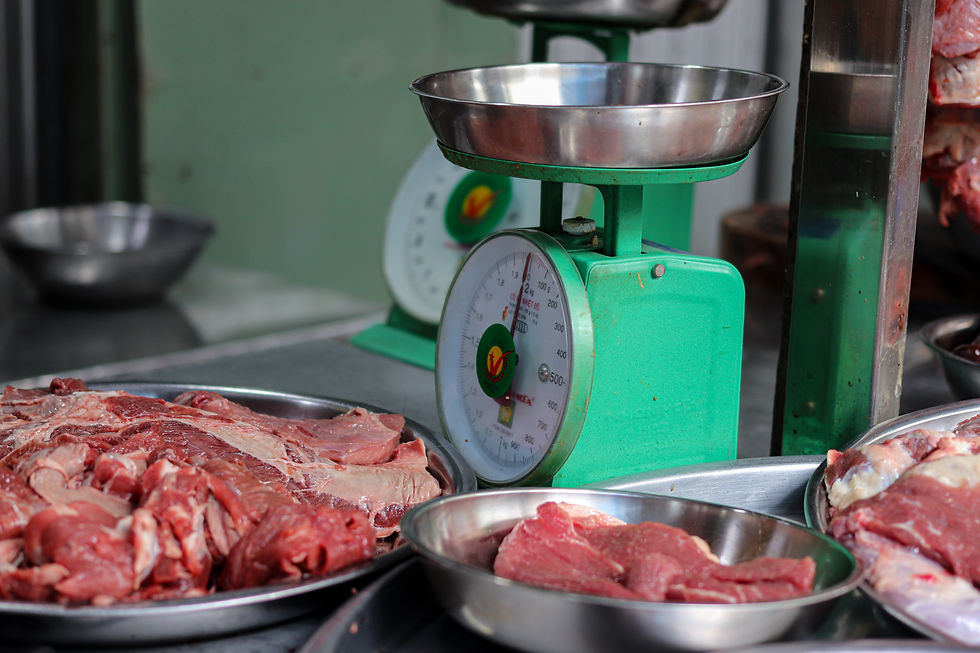%20(1000%20%C3%97%20300px).png)

Food and Socialisation
We support owners to do what suits them and what they can manage. We recommend getting as high a quality food that is available, you can afford and that fits into your lifestyle. We feed our dogs primarily raw food, with an addition of premium dog food brands. We "prime" the digestive systems of our puppies by feeding them a range of foods including mince, organ meats and premium dog food.
Eating raw
Our vets have advised our dogs can eat any human-grade meat raw. We scour the supermarkets and butchers and find: heart, liver, lung, kidney, brains, off-cuts, whole chickens, chicken necks, giblets, eggs and any human meat that's on sale. We pay between $4 and $11 per kg, Then we take it home and cut it up and refrigerate it. We then give the dogs several options on their plates. We also sometimes use a premium topper and bones to ensure they get the nourishment they need.
Eating cooked
For some reason our dogs really do prefer the liver cooked - so we fry it up quickly. Its messy anway so it suits us. We also put whole chickens in our slow cooker. We strip off the meat and skin after a few hours, and then cook the bones right down so the dogs get the full goodness of the chicken.
Food options we recommend

Socialisation and the fear stage
The socialisation window for dogs is approximately 16 weeks. Think of your puppy's early months as a crucial window of opportunity. This period, often referred to as the socialisation window, is a time when puppies are most receptive to new experiences and form lasting impressions. It's a crucial chance to introduce them to a variety of people, animals, places, and situations.
Why is Socialisation Important?
A well-socialised puppy grows into a confident, well-adjusted adult dog. Socialisation helps to:
-
Reduce Fear and Anxiety: By exposing your puppy to a wide range of stimuli, you can help them develop a calm and fearless demeanor.
-
Improve Behaviour: A well-socialised dog is more likely to behave appropriately in different situations.
-
Strengthen the Bond: Positive social experiences can deepen the bond between you and your furry friend.
How to Socialise Your Puppy
Here are some tips to help you effectively socialise your puppy:
-
Start Early: Begin socialisation as soon as you bring your puppy home.
-
Positive Experiences: Ensure all interactions are positive and rewarding. Use treats, praise, and gentle encouragement.
-
Expose to a Variety: Introduce your puppy to different people, animals, sounds, sights, and smells.
-
Short and Sweet: Keep socialisation sessions short and positive to avoid overwhelming your puppy.
-
Safe and Controlled Environments: Start in low-stress environments and gradually introduce more challenging situations.
-
Puppy Classes: Consider enrolling your puppy in a puppy training class to socialize them with other dogs and people.
-
Everyday Adventures: Take your puppy on walks, to the park, or to visit friends and family.
Common Socialisation Mistakes to Avoid
-
Overwhelming Your Puppy: Too much stimulation too soon can lead to fear and anxiety.
-
Neglecting Negative Experiences: Ignoring negative experiences can lead to fear and aggression.
-
Relying Solely on Puppy Classes: While puppy classes are beneficial, they should complement, not replace, daily socialisation.
-
By taking the time to socialise your puppy, you're investing in their future happiness and well-being. A well-socialised dog is a joy to have around and a valuable member of the family.
-
Not doing all you can in those first crucial few weeks.
Our socialisation approach
We follow the "Puppy culture" approach to socialisation. This includes very gently introducing the puppies to a range of experiences from a very young age. By the time you take one of our puppies home we would have given them experiences in the car, the school run, with kids, cats, older and younger dogs, shops and the cafe at a minimum. We do a lot lot more, taking the puppies to busy environments as we go about our lives.